

Nine Companies Tied to PRISM, Obama Will Be Smacked With Class-Action Lawsuit Wednesday. Former Justice Department prosecutor Larry Klayman amended an existing lawsuit against Verizon and a slew of Obama administration officials Monday to make it the first class-action lawsuit in response to the publication of a secret court order instructing Verizon to hand over the phone records of millions of American customers on an "ongoing, daily basis.
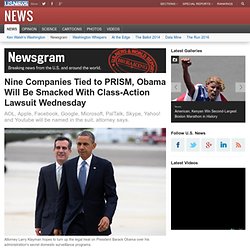
" Klayman told U.S. News he will file a second class-action lawsuit Wednesday in the U.S. European parliament denounces PRISM. New leak shows feds can access user accounts for Google, Facebook and more. It’s worse than we thought.
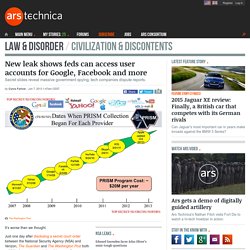
Just one day after disclosing a secret court order between the National Security Agency (NSA) and Verizon, The Guardian and The Washington Post both published secret presentation slides revealing a previously undisclosed massive surveillance program called PRISM. The program has the capability to collect data “directly from the servers” of major American tech companies, including Microsoft, Google, Apple, Facebook, and Yahoo. (Dropbox is said to be “coming soon.”) PRISM fallout: European legislators furious about U.S. surveillance. Photo by Win McNamee/Getty Images When details emerged last week about the National Security Agency’s Internet surveillance system PRISM, President Obama attempted to reassure Americans that it was not being used to target them.
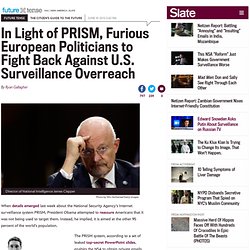
Instead, he implied, it is aimed at the other 95 percent of the world’s population. Ryan Gallagher is a journalist who reports on surveillance, security, and civil liberties. Follow The PRISM system, according to a set of leaked top-secret PowerPoint slides, enables the NSA to obtain private emails and other user data directly from the central servers of major Internet companies such as Google, Microsoft, Facebook, and Yahoo. The existence of PRISM provides vindication for privacy advocates worldwide who have been voicing alarm about the U.S. government’s ability to conduct mass surveillance of foreigners’ communications sent and received using services like Google’s Gmail and Microsoft’s Hotmail and Skype. That appears to be precisely what PRISM enables. Section 215 of the Patriot Act - FOIA. On whistleblowers and government threats of investigation. We followed Wednesday's story about the NSA's bulk telephone record-gathering with one yesterday about the agency's direct access to the servers of the world's largest internet companies.
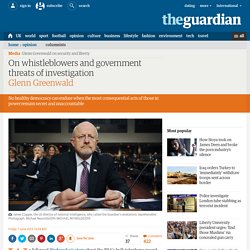
I don't have time at the moment to address all of the fallout because - to borrow someone else's phrase - I'm Looking Forward to future revelations that are coming (and coming shortly), not Looking Backward to ones that have already come. But I do want to make two points. Protecting Your Privacy Rights. Our constitutional right to be free from "unreasonable searches and seizures" applies regardless of whether we are talking about letters kept in a desk or emails stored online.
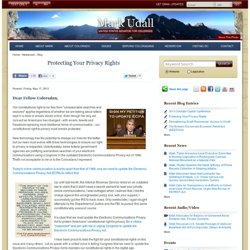
Even though the way we connect as Americans has changed - with emails, tweets and Facebook replacing more traditional forms of communication - our constitutional right to privacy must remain protected. New technology has the potential to change our lives for the better, but our laws must evolve with those technologies to ensure our right to privacy is respected. Unfortunately, some federal government agencies are justifying warrantless searches of your electronic communications using a loophole in the outdated Electronic Communications Privacy Act of 1986. Tech Companies Concede to Surveillance Program. Revealed: NSA collecting phone records of millions of Americans daily.
Verizon forced to hand over telephone data – full court ruling. The NSA Surveillance Order, Explained by the ACLU. Boundless Informant: the NSA's secret tool to track global surveillance data. The National Security Agency has developed a powerful tool for recording and analysing where its intelligence comes from, raising questions about its repeated assurances to Congress that it cannot keep track of all the surveillance it performs on American communications.
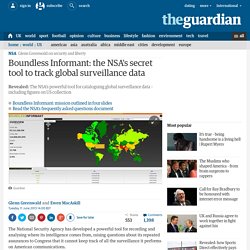
U.S. Confirms That It Gathers Online Data Overseas. U.S. Maintains Vast Database of Phone Calls, Lawmakers Say. The disclosure on Wednesday of a classified court order to a Verizon subsidiary opened the door into a secret program that originated with the Bush administration’s post-9/11 surveillance and whose survival, in some form, into the Obama administration has long been the subject of hints and speculation. The disclosure that the government is indeed vacuuming up and retaining “metadata” – like records of all calls made and received, but not their content – from telecommunications carriers provoked public discussion, as the Obama administration and some members of Congress from both parties defended the program, even as privacy advocates expressed furor. Responding to the disclosure, Senator Dianne Feinstein of California and Senator Saxby Chambliss of Georgia said on Thursday that the order appeared to be a routine reauthorization as part of a broader program that lawmakers have long known about.
“It’s metadata only and it’s what we call minimized,” Mr. Chambliss said. NSA has direct access to tech giants' systems for user data, secret files reveal. The National Security Agency has obtained direct access to the systems of Google, Facebook, Apple and other US internet giants, according to a top secret document obtained by the Guardian.
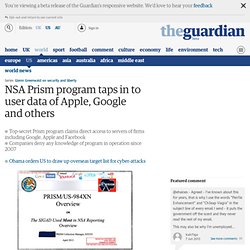
The NSA access is part of a previously undisclosed program called Prism, which allows officials to collect material including search history, the content of emails, file transfers and live chats, the document says. The Guardian has verified the authenticity of the document, a 41-slide PowerPoint presentation – classified as top secret with no distribution to foreign allies – which was apparently used to train intelligence operatives on the capabilities of the program. The document claims "collection directly from the servers" of major US service providers. NSA Prism program taps in to user data of Apple, Google and others.
Denials and What They Really Mean. Google, Facebook, Dropbox, Yahoo, Microsoft And Apple Deny Participation In NSA PRISM Surveillance Program. The Washington Post today reported that Google, Apple, Facebook, Dropbox, Microsoft, Paltalk, AOL (TechCrunch’s parent company) and Yahoo participated in the so-called PRISM program which provided the NSA with what looks like virtually direct access to their servers and their users’ data.
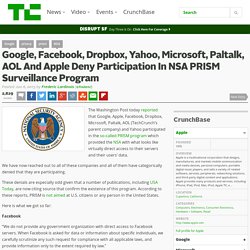
We have now reached out to all of these companies and all of them have categorically denied that they are participating. These denials are especially odd given that a number of publications, including USA Today, are now citing source that confirm the existence of this program. According to these reports, PRISM is not aimed at U.S. citizens or any person in the United States. Here is what we got so far: Facebook “We do not provide any government organization with direct access to Facebook servers. Parsing PRISM denials: Could everyone be telling the truth?
A day after The Washington Post and Guardian published bombshell revelations that America’s biggest tech companies are allowing the U.S. government to constantly monitor highly personal data contained in their servers, the facts remain fuzzy and somewhat fluid—and the statements of the parties involved don’t add up.
All the tech companies have issued denials , saying they haven't given the government “direct” access or a “back door” to their servers under a surveillance program called PRISM, as the Post and Guardian stories claim. Google Google’s Larry Page repeated his company’s denials in a blog post today: “First, we have not joined any program that would give the U.S. government—or any other government—direct access to our servers. Indeed, the U.S. government does not have direct access or a 'back door' to the information stored in our data centers.
" The National Security Administration is saying the news stories are “full of inaccuracies,” but isn’t saying what the inaccuracies are. NSA scandal: Microsoft and Twitter join calls to disclose data requests. Microsoft and Twitter have joined calls by Google and Facebook to be able to publish more detail about how many secret requests they receive to hand over user data under the controversial Foreign Intelligence Surveillance Act (Fisa).
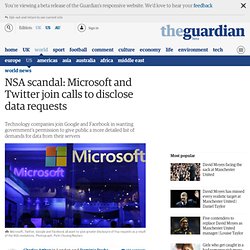
"Permitting greater transparency on the aggregate volume and scope of national security requests, including Fisa orders, would help the community understand and debate these important issues," Microsoft said in an emailed statement to the Reuters news agency. At Twitter the chief lawyer, Alex Macgillivray, tweeted: "We'd like more NSL [national security letter] transparency and Twitter supports efforts to make that happen.
" A national security letter is used by US government agencies such as the FBI and NSA to demand access to data from companies – who are forbidden from revealing that they have been served such a request. Fisa requests come with gag orders, meaning Google, Facebook and other tech companies cannot say whether they have received them. Wyden, Udall Question the Value and Efficacy of Phone Records Collection in Stopping Attacks. Wyden Statement on Alleged Large-Scale Collection of Phone Records. Europe is Pissed. European parliament denounces PRISM. How to protect your PC from PRISM surveillance. Thursday afternoon, a bombshell dropped: Two leading reports claimed that the U.S. government has been spying on emails, searches, Skype calls, and other electronic communications used by Americans for the last several years, via a program known as PRISM.
According to the reports, the Web’s largest names—AOL, Apple, Facebook, Google, Microsoft, Skype, PalTalk, Yahoo, and YouTube—participated, perhaps unwittingly. (Dropbox will reportedly be added as well.) Retired Federal Judge: Your Faith In Secret Surveillance Court Is Dramatically Misplaced. By Nicole Flatow "Retired Federal Judge: Your Faith In Secret Surveillance Court Is Dramatically Misplaced" A retired federal judge warned Friday against blind faith in the secret court deciding the scope of U.S. government surveillance.

During a panel discussion on constitutional privacy protection in the wake of a leaked Foreign Intelligence Surveillance Court decision that revealed widespread NSA data collection, U.S. District Judge Nancy Gertner stood up in the audience to counter the statements of conservative law professor Nathan Sales that secret surveillance requests are subject to meaningful judicial review. She cautioned: As a former Article III judge, I can tell you that your faith in the FISA Court is dramatically misplaced.Two reasons: One … The Fourth Amendment frameworks have been substantially diluted in the ordinary police case. The National Security Agency’s Domestic Spying Program. Why Government Access to Metadata is More Than a 'Modest Encroachment' on Privacy. Metadata is back in the news, following The Guardian's extraordinary revelation on Wednesday revealing that the National Security Agency has been secretly scooping up the phone records of millions of Americans.
But intelligence officials – echoed by President Obama today, who characterized access to metadata a "modest encroachment" on privacy – are implying that the information they're collecting is relatively innocuous, since they don't listen in on the actual phone conversations. In an op-ed for Reuters , Ben Wizner and I explain why government access to metadata – which reveals whom you talked to, from where, and for how long – is a gross privacy invasion: 'I Cannot Figure Out Why This Was Classified to Begin With' - James Fallows. Will the NSA pursue legal action against journalist Glenn Greenwald?